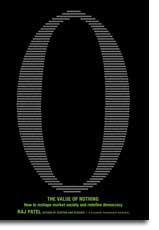A Call For A Democratic Economy
By Zach Carter
09 August, 2010
YES! Magazine
Raj Patel offers a stunning defense of democracy and a how-to guide for social justice activists of the next century
The Value of Nothing
By Raj Patel
Picador, 2010, 256 pages, $14
Ayn Rand once praised money as one of humanity’s greatest inventions, and even the most ardent socialist must admit that money accomplishes a pretty clever trick. Fortunately, we don’t have to haul cows or cauliflower to market every time we want to buy books or bacon. The trouble is, money doesn’t work on everything. You can’t put a price on love or life, and as a result, our modern metric of progress—economics—privileges balance sheets at the expense of human welfare. The government devotes massive resources to bank bailouts while neglecting real social needs.
This is the central argument of Raj Patel’s new book, The Value of Nothing, and the intellectual thrashing he gives Rand is a joy to read. Over the course of 200 pages, the reader comes to see how Rand’s peculiar worship of selfishness has come to dominate both the economic profession and the policy agenda of powerful nations, despite consistent, socially destructive results. Using hilarious and often painful evidence from the financial crash of 2008, Patel challenges the very root of contemporary economics—the sanctity of market-based prices—to demonstrate that markets must be deployed in the service of the social good.
This is the opposite of how major economic systems currently function, devoting public goods to the service of private profits. Along the way, Patel demonstrates how market fundamentalists have substituted Rand’s cruel philosophy for the more nuanced and sophisticated writings of Adam Smith, and many readers will be surprised to see the similarities Patel highlights between Smith (who brought us the notion of the “invisible hand” of the market) and his supposed intellectual adversaries, Karl Marx and John Maynard Keynes.
Rand and former Federal Reserve Chairman Alan Greenspan liked to pretend that markets exist in a vacuum of pure capitalism, but the truth is that markets function within a set of rules determined by society. If the rules are bad, then the market results are socially dysfunctional. After watching the global economy destroy itself, it’s time for some better rules. While financial regulatory reform is part of the solution, Patel argues that curing our economic ills will require a more fundamental political approach. Market worship has turned citizens into shoppers (an argument advanced by economist James Galbraith in The Predator State). If markets are to work, Patel argues, we must embrace the democratic ideal in the fullest sense: active, collective engagement in the political affairs that guide our social interactions. 
This is not an argument about voting, but an argument for civic engagement—setting community standards, arbiting disputes between members of the community, and advancing a continual, communal interest in justice. We cannot continue to live under the illusion that anything with a high price tag is inherently socially valuable. We must act together as citizens to set values and live up to them. Acting alone, as consumers, this kind of action is simply impossible.
Patel’s accomplishment with The Value of Nothing should not be understated. He has written what is very likely the greatest introductory economics text that has ever been written, a stunning defense of democracy, and a plausible how-to guide for the social justice activists of the next century.
Patel’s solution is one of radical democracy, but radical only when compared to our current celebrity political culture. Instead of voting for our favorite overlord every four years, citizens should be organizing and taking an active role in establishing the rules that govern their own lives. These kinds of societies have existed before, and exist today. Patel’s primary models are ancient Athenians and the contemporary Zapatistas. For the Zapatistas, democracy is a way of life, rather than a rare and unpleasant ritual.
Their government is decentralized into a set of small, local governing councils, each headed by council members who serve terms of only a few weeks. Without access to long-term political power, rulers focus on what works for their community, rather than what facilitates a more robust political career. Each rotating council sends members to another, higher-level council which can in turn resolve disputes between locales. This bottom-up democratic model requires citizens to set values on an almost constant basis—from land to labor. The idea sounds crazy until one realizes that the Greek democracy so prized by the intellectual founders of the United States was actually quite similar.
Even in popular culture, Patel’s basic argument is not new. The Beatles sang “money can’t buy me love” more than 40 years ago. But after the Lehman Brothers bankruptcy, the bank bailout, and the current unemployment scourge, this concept is more important than ever. Policy-makers still seem unable to come to grips with how fundamentally untenable the crash of ’08 revealed our economic system to be. We have built an economy on rampant selfishness, a strategy that only a child could believe would lead to socially productive outcomes. But rather than accept this system’s failure, policy-makers seem to be reconciling themselves to the notion that social goods like a decent job, a good meal, and a roof over one’s head are not really social goods at all—if today’s market forces don’t guarantee them, they must not be important. But with intellectuals like Patel to guide us, all is not yet lost.
Zach Carter wrote this review for Water Solutions, the Summer 2010 issue of YES! Magazine. Zach is an economics editor at AlterNet and a Fellow at the Campaign for America’s Future.
YES! Magazine encourages you to make free use of this article by taking these easy steps. This work is licensed under a Creative Commons License

